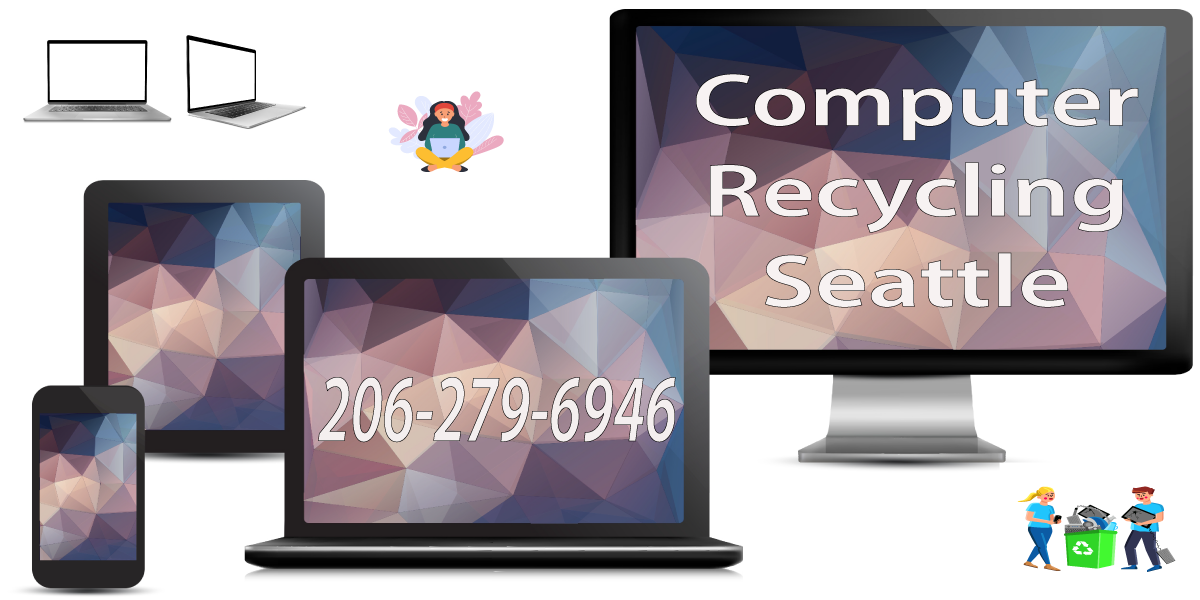E-waste Recycling Information And Overview
Society as a whole has received great advantages from new low-cost electronic gadgets. However, the enormous expansion of the electronics sector has resulted in a fast growing issue of end-of-life (EOL) devices, sometimes known as e-waste, or electronic waste. Toxic elements from outdated electronic gadgets might be discharged into the environment in landfills from inadequate recycling activities and practices. That’s where Computer Recycling Seattle comes in.
E-waste is on the rise, which necessitates the implementation of comprehensive electronics recycling schemes and methods. According to a World Economic Forum research released in January 2019, E-waste is currently the world’s fastest-growing waste stream. They had an anticipated waste stream estimate of 48.5 million tons in 2018.
People are still looking for information about TV recycling, computer recycling, and other services that will allow them to dispose of obsolete equipment properly while reducing the danger of data or identity theft or environmental contamination.

Policymakers, businesses, and consumers are all paying more attention to the safe recycling of electronics such as computers, laptops, servers, cell phones, tablets, Macs and everything else. This is encouraging because many electronics users, and businesses are still unsure how to properly dispose of outdated laptops, cellphones, and other electronic gadgets. According to one study, approximately 75% of obsolete electronics are still being kept in households due to a lack of simple disposal choices. Computer Recycling Seattle wants to make it as easy as possible to recycle these items if you live in the Seattle Area.
We will now examine some of the fundamental issues, such as defining E-waste, examining why recycling it is essential, how consumers may recycle electronics, state regulations, and the issue of dangerous E-waste being shipped internationally.
What Is Electronic Waste E-waste?
EOL electronic devices, often known as E-waste or E-scrap, include things like old computers, laptops, stereos, TVs, and cell phones and many other items. Even while many of these devices may be reconditioned when recycled, a considerable percentage still ends up in landfills unfortunately. Surprisingly, only 20% of worldwide E-waste is formally recycled; the other 80% is frequently burnt or disposed of in landfills. “Thousands of tons also make their way around the world to be ripped apart by hand or burnt by the world’s lowest employees,” according to the World Economic Forum. “This primitive kind of urban mining has negative repercussions for people’s health and causes massive pollution.” The E-waste recycling rate in the United States is closer to 25%, with much of the E-waste being exported abroad.
What Is the Importance of Electronics Recycling?
A plentiful supply of raw materials: Only 10-15% of the gold in e-waste is effectively retrieved globally, while the remainder is lost. According to the United Nations, electronic trash includes precious metal reserves that are between 40 and 50 times richer than ores obtained from the soil.
Management of Solid Waste: Because of the explosive growth of the electronics sector, paired with short product life cycles in many cases, E-waste output has increased rapidly. This is not good for the planet. We need more companies and recyclers like Computer Recycling Seattle to help expand electronics recycling whenever possible.
Toxic Substances: Because obsolete electrical equipment contain harmful compounds including lead, mercury, cadmium, and chromium, adequate processing is required to prevent these materials from being discharged into the environment. Especially groundwater, or the air. Other heavy metals and possibly harmful chemical flame retardants may also be present in E-waste, and this makes it imperative these items are disposed of properly.
Hazardous Waste Transport on a Global Scale: The unrestricted flow of E-waste to nations with cheap labor and rudimentary recycling methods has resulted in residents being exposed to toxins in certain areas. This is currently being addresses when possible, but the sheer amount of Electronic Waste is enormous, and growing.
End Talk:
Although its very difficult to keep up with proper E-waste management on a global scale there are a few firms providing recycling services. Computer Recycling Seattle recycles laptops, Macbooks, computers cell phones and most other types of E-waste. This includes cables, and wire too. We use efficient methods which are environmentally friendly and also keep your data safe by destroying the hard drives from recycled computers, and laptops. Head to Computer Recycling Seattle to have your electronic device recycled properly. We refurbish recycled computers, and laptops and make them ready for re-use whenever possible, which is the best way to recycle electronics. It is the Socially Responsible thing to do to properly recycle your electronics.

